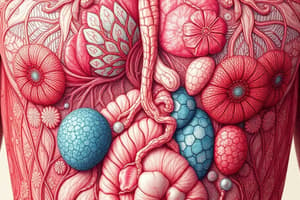Podcast
Questions and Answers
What is the main function of blood in the body?
What is the main function of blood in the body?
- Regulating body temperature
- Producing immune cells
- Maintaining bone density
- Transporting oxygen, nutrients, and waste products (correct)
Where is lymphatic tissue found in the body?
Where is lymphatic tissue found in the body?
- Only in the lymph nodes
- Exclusively in the skin
- Throughout the body, including in the heart, lungs, and lymph nodes (correct)
- Mainly in the digestive system
What are some common disorders that affect connective tissues?
What are some common disorders that affect connective tissues?
- Asthma, bronchitis, and pneumonia
- Rheumatoid arthritis, scleroderma, and lupus (correct)
- Migraine, vertigo, and epilepsy
- Diabetes, hypertension, and obesity
What can cause disorders affecting connective tissues?
What can cause disorders affecting connective tissues?
What are the two main proteins that compose connective tissue?
What are the two main proteins that compose connective tissue?
Where is dense connective tissue primarily found?
Where is dense connective tissue primarily found?
What is the primary function of loose connective tissue?
What is the primary function of loose connective tissue?
Which specialized connective tissue is responsible for storing energy in the form of fat?
Which specialized connective tissue is responsible for storing energy in the form of fat?
Which tissue type provides strength and stability to structures like bones, ligaments, and tendons?
Which tissue type provides strength and stability to structures like bones, ligaments, and tendons?
What type of tissue protects and supports various structures in the body, such as joints?
What type of tissue protects and supports various structures in the body, such as joints?
Flashcards are hidden until you start studying
Study Notes
Connective Tissue: Types and Functions
Connective tissue is a fundamental tissue type in the human body, responsible for connecting, supporting, and providing strength to various structures. It is composed mainly of two proteins: collagen and elastin. There are two main types of connective tissue: connective tissue proper and specialized connective tissue.
Connective Tissue Proper
Connective tissue proper can be further divided into two categories:
-
Loose connective tissue: This type of connective tissue is found in areas such as the skin, lungs, and blood vessels. It provides support and allows for movement of the attached structures.
-
Dense connective tissue: This type of connective tissue is found in structures like bones, ligaments, and tendons. It provides strength and stability to the structures it surrounds.
Specialized Connective Tissue
Specialized connective tissues include adipose, cartilage, blood, and lymphatic tissues. These tissues contribute to diverse functions in the body.
-
Adipose tissue: This type of tissue stores energy in the form of fat and is found under the skin and in the abdominal cavity.
-
Cartilage: Cartilage is a tough, resilient tissue that protects and supports various structures in the body, such as joints and the walls of the lungs and heart.
-
Blood: Blood is a specialized connective tissue that transports oxygen, nutrients, and waste products throughout the body.
-
Lymphatic tissue: This tissue is responsible for the immune system and is found throughout the body, including in the heart, lungs, and lymph nodes.
Connective tissues are essential for various functions in the body, and their integrity is crucial for maintaining the structural integrity and overall function of the body's structures. There are over 200 disorders that affect connective tissues, which can be caused by genetic factors, environmental factors, or of unknown cause. These conditions can affect various body parts, such as skin, eyes, heart, lungs, kidneys, gastrointestinal tract, and blood vessels. Some common connective tissue diseases include rheumatoid arthritis, scleroderma, lupus, and Ehlers-Danlos syndrome.
Studying That Suits You
Use AI to generate personalized quizzes and flashcards to suit your learning preferences.




